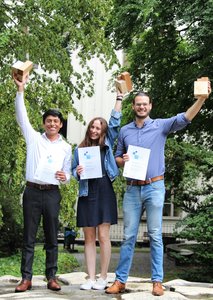Friday, 21 July, 2023
From basic research to application - Nano Innovation Award 2023
The LMU Center for NanoScience and four LMU spin-off companies jointly award prizes for innovative doctoral theses.
Three doctoral researchers from Munich and Erlangen have been awarded this year's Nano Innovation Award by the Center for NanoScience. The prize for innovative research in application-oriented nanosciences is worth €9,000. From applicants throughout Bavaria, the winners were selected by an expert jury from industry and academia.
While most science prizes honour excellent results in basic research, the Nano Innovation Award distinguishes itself by emphasizing high innovation and potential applications. Together with CeNS, the companies attocube systems, ibidi, Nanion Technologies and NanoTemper Technologies award the prize to talented and creative young scientists whose results are not only of interest for basic research but also promise future technological potential.
The first prize went to Stephan Müssig from Friedrich-Alexander-University Erlangen-Nürnberg. In his work, he investigated nanoparticle-based microparticles based on the relatively novel and application-relevant characterization method "magnetic particle spectroscopy" (MPS). Stephan Müssig found out which particle designs can generate functionalities and thus open up great potential for a magnetic identification technology. He has filed a patent application on identification of objects with magnetic supraparticles by MPS and already validated his scientifically published "proof-of-principle" in feasibility studies with various industrial companies and agencies, interested in his findings.
The jury awarded the second place to Pauline Kolbeck from LMU Munich. The accuracy of Atomic Force Microscopy (AFM) measurements is limited by the finite size of the AFM tip. To overcome this limitation, Pauline developed a 3D DNA origami fiducial for accurate and reliable AFM tip characterization and image reconstruction, to provide a multimodal calibration platform for a variety of applications. Her technological development resulted in several publications and a patent, and it has been made commercially available to the scientific community.
Jose-Tomas Santiago-Cruz from the Max Planck Institute for the Science of Light secured the third place. His PhD project was dedicated to the ambitious task of generating entangled photons in metasurfaces. Metasurfaces, i.e., two-dimensional arrays of nanoparticles, are revolutionizing the field of optics. Now, in quantum optics, they enable scalable and multifunctional platforms for quantum states generation. Tomas' results are promising for applications requiring high temporal resolution and could can have a huge impact in imaging applications where subwavelength resolution is needed.
"Once again this year, all applications for the Nano Innovation Award exhibited remarkably high levels of creativity and quality. Congratulations to all participants and the deserving winners.", says Joachim Rädler, CeNS spokesman and professor of soft matter physics at LMU Munich.


